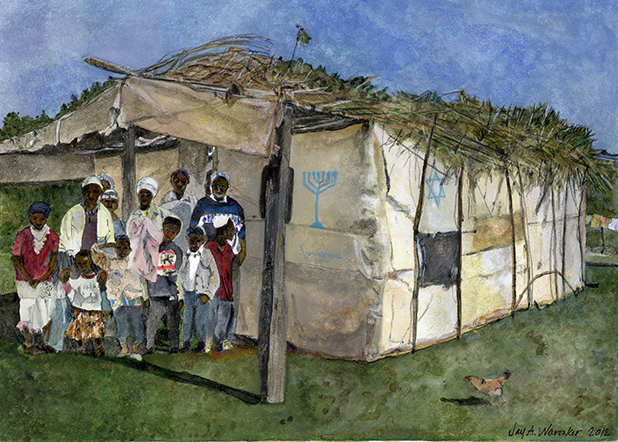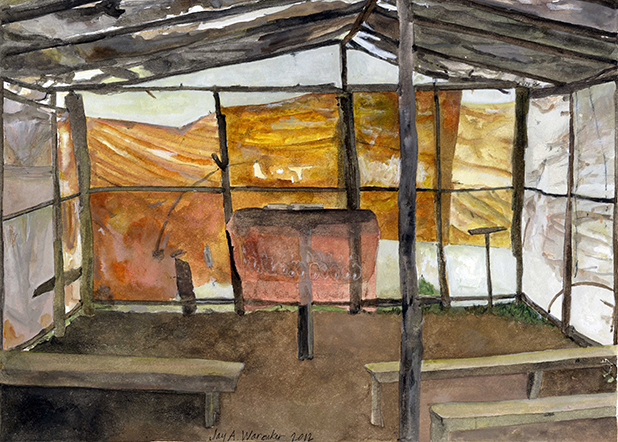 Exterior View (2011), 15” x 11” Watercolor, Jay A. Waronker
Exterior View (2011), 15” x 11” Watercolor, Jay A. Waronker
kenya
Temporary Sanctuary (Early 21st Century) |
|

Interior View (2011), 15” x 11” Watercolor, Jay A. Waronker
|
Since the turn of the twenty-first century, a relatively small emergent community of black Jews has been forming in Kasuku in the Laikipia District of Kenya. Kasuku is located in the Rift Valley near Ol Kalou, the capital of Nyandurua County, in a green and mountainous area of western Kenya some three and one-half hours from Nairobi.
The Jewish community of Kasuku is made up of a few dozen members who on their own volition came to abandon their Christian beliefs to methodical embrace Judaism. Although at first Messianic, they came to believe that their religious beliefs were incompatible with Christianity, and it was then that they began their journey towards Judaism. At first they had some contact with the white Jewish community in Nairobi, but they provided them little substantive guidance and assistance. When they learned about the black Abayudaya Jews of neighboring Uganda, they reached out to them. Foreign Jews, included those associated with the international organization KULANU, have stepped in to help the Kasuku Jews as they are now waiting to be instructed in traditional Judaism and formally converted. Some of the younger children of this community have been sent to the Abayudaya schools in eastern Uganda to be educated in Judaism.
While few formal places of prayer have been realized by a broad pool of people in this area of Kenya who may make claim of a lineage to ancient Jewish lost tribes, the Jewish community of Kasuku built a temporary structure a few years back. In the tradition of the portable ancient Court of the Tabernacle or the seasonal sukkah built during the holiday of Sukkot, this tent-like space with its simple and thin wooden post and beam construction fabricated from local trees then covered in thin fabric along the side and thatching at the roof, is a modest but particularly atmospheric space. Compared to many synagogues around the world with their grander spaces and more luxurious appointments, the Jewish house of prayer in Kasuku may seem rudimentary if not primitive, yet what has been created here in the ancient Jewish tradition is a simple yet effective place for gathering. It is an endearing place, a distinct sense of place, and highly memorable.
To the outside, the temporary structure set on a flat grassy and dirt surrounded by vegetation and near other small buildings, is decorated with Stars of David, menorot (candelabras), and the Hebrew Beit Midrash (House of Prayer). On the inside, it contains a dirt floor where rows of rudimentary benches and a lectern used for leading the prayer service are set.
The congregation does not have a Torah, yet they do have a single Chumash (Pentateuch), which they treat with respect. On a regular basis Shabbat prayers are held in the synagogue, and the service is led by a local layman of the congregation. Though some members of the community have officially converted before a Beit Din (Jewish Court) in Uganda, most of the community has not. Although they may not be legally Jewish, their self-taught or outside-assisted knowledge and commitment to Judaism is deep and sincere.
